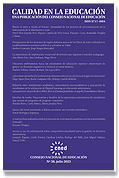Evening Higher Education: Expectations and Challenges for Students in Evening Degree Programs
DOI:
https://doi.org/10.31619/caledu.n58.1331Keywords:
higher education, evening students, college experience, non-traditional studentsAbstract
Enrollment in evening higher education programs in Chile has significantly increased over the last two decades, enabling the inclusion of non-traditional students who pursue their college during evening hours. However, despite their active participation in the system and the availability of academic programs, there is evidence of insufficient institutional support to address the unique needs and interests of evening students. It appears that the structure of evening colleges has been predominantly designed to cater to daytime pupils.
The goal of this research is to gain insights into the college experience of evening undergraduate students from five Chilean universities. Through a qualitative study focusing on the processes of social and academic integration into the university, this paper aims to identify the needs and challenges faced by these students, in order to contribute toward improving their educational trajectories. The findings highlight that student experiences are influenced by a triple role that evening students assume, involving their responsibilities as parents, workers and students. It emphasizes the support required to align their academic pursuits with their multifaceted lives, as well as the variations in educational expectations and personal goals across different geographical areas.
Furthermore, the results of this study indicate that the institutional support mechanisms are strained due to the changing characteristics of the evening student population. This research is relevant due to its recognition of the diversification of students at tertiary educational level and its alignment with the principles of equity and, which are essential quality criteria defined by the National Accreditation Commission.
Downloads
Published
Issue
Section
License
Authors retain their Copyright and only transfer a part of these to the journal, accepting the following conditions:
Authors keep their rights as authors and guarantee the right to the journal for the first publication of their work, which is simultaneously subject to the Creative Commons Attribution license allowing third parties to share the study accrediting the author and first publication in this journal.
Authors may adopt other non-exclusive license agreements for distribution of the version of the published work (e.g. inclusion in an institutional thematic file or publication in a monographic volume) accrediting initial publication in this journal.
Authors are allowed and recommended to share their work over the Internet (e.g. in institutional telematic files or their website) before and during the submission process, which may lead to interesting exchanges and increased citation of the published work. (See The effect of open access).

